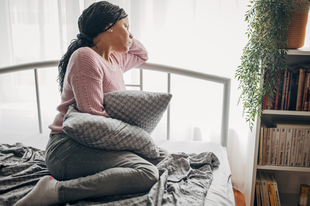Pain and ovarian cancer

Explore the connection between ovarian cancer and pain.
What does ovarian cancer pain feel like?
Pain, pressure or discomfort in your abdomen (or tummy) can be a symptom of ovarian cancer. The pain is usually a result of the growth of a tumour, causing discomfort to the surrounding area. It's important to understand the various types of pain that can indicate ovarian cancer, as well as when you should see a doctor.
Is pain a symptom of ovarian cancer?
Abdominal pain can be caused by many things and is most likely not due to ovarian cancer. However, one of the four key symptoms of ovarian cancer is pain in your lower abdomen, tummy or the area between the hips (pelvis). This can also include a feeling of discomfort, pressure or tenderness. Pain associated with ovarian cancer can also include lower back pain. If you experience any of these symptoms persistently, meaning the pain doesn’t come and go but it is there most days for several weeks, you should visit your GP.
Why does ovarian cancer cause pain?
Alongside abdominal discomfort at the earlier stages of ovarian cancer, pain can continue and become more noticeable in the advanced stages of ovarian cancer when the cancer has grown. This pain can be connected to the cancer growing and putting pressure on the organs in the pelvis, or due to cancer spreading into other areas of the body. Some people with advanced ovarian cancer experience discomfort, fullness and pressure in their tummy due to ascites, which is a build-up of fluid in the abdomen. If you experience this, your clinical team can help to reduce the discomfort by draining some of the fluid.
Sometimes treatment for ovarian cancer can cause discomfort or pain, so always speak to your clinical team as they can help you to reduce or deal with these issues.
Possible ovarian cancer pain locations
Ovarian cancer pain can present itself in several locations, most often in the abdomen or tummy area. This is one of the four key symptoms of ovarian cancer.
Abdominal pain
Abdominal pain indicating ovarian cancer can present itself as a dull ache or feeling of constant pressure or fullness in your tummy. The discomfort could be felt throughout your tummy, or only on one side. You may also have discomfort that feels like indigestion or heartburn. This pressure in your tummy could also lead to another symptom, which is needing to wee more often or more urgently.
Pelvic pain that feels like period cramps is another symptom of early ovarian cancer. Like bloating, occasional pelvic pain is common, especially during menstruation, and this is why this symptom may be overlooked.
The pain associated with ovarian cancer is persistent and frequent, meaning it doesn’t come and go, and you experience it regularly (at least 12 times in a month). If you experience this, speak to your GP.
Hip pain
Hip pain can be caused by many things, such as muscle and joint injuries or diseases like arthritis. It is possible for pain in your hips to be caused by a cancer that has spread from its starting point (called metastases). Sometimes pain is felt in the area between the hips, and it cancan be tricky to work out where exactly the pain is coming from.
If you have pain in this area that doesn’t go away, and has been there for several weeks, visit your GP.
Back pain
Back pain in the lower back or flank region (the idea of the body between the ribs and the hip) can be a sign of ovarian cancer. The pain can feel like period pain cramps. If you have lower back pain that you have felt most days for several weeks, speak to your GP.
Leg pain
Pain that begins in your abdomen or lower back can spread to your legs. Sometimes it can feel like your legs are the source of the pain so it’s tricky to work out the source.
If you already have an ovarian cancer diagnosis, leg pain can be a side effect of treatment rather than directly caused by the cancer itself.
Shoulder pain
A much less common symptom of ovarian cancer can be shoulder and shoulder blade pain. Shoulder pain is often the result of muscle strain; however, it can also be referred to as pain due to cancer in another area of the body. This can also be a sign in advanced stages of ovarian cancer that the disease is growing through one part of the body and into another.
Pain during sex
Pain during sexual intercourse can be due to many different reasons but can be a symptom of cancer including ovarian cancer. Make sure you speak to your doctor if you experience this.
What does pain caused by ovarian cancer feel like?
Pain caused by ovarian cancer could feel like a constant pain or a dull ache. It could also feel like pressure or fullness. The pain or discomfort could be felt all over your abdomen or pelvic area, or only on one side. It can also feel like heartburn or indigestion, or general tenderness. Pain can also be felt in the lower back.
Does ovarian cancer pain come and go?
Ovarian cancer symptoms do not typically come and go. The pain is frequent, usually happening more than 12 times a month and persistent. It’s also important to establish whether the symptoms are new to you to distinguish between other chronic conditions such as endometriosis. A useful tool is our symptoms diary- keep track of your symptoms over several weeks and note down how often and how severe they are. This will be a good summary for your GP.
Acute vs chronic pain
“Acute pain” means pain that comes on suddenly, often feels sharp and goes away when the cause is removed or fixed.
“Chronic pain” refers to pain that happens regularly and lasts for months and can continue even if the injury or illness that caused it has been healed or treated. Chronic pain can be linked to conditions such as cancer.
There are certain medical issues, such as ovarian cysts, ovarian torsion (when the ovary twists around the ligaments that hold it in place) or ectopic pregnancy that can cause sudden, extreme pain and require immediate medical attention.
Pain that starts in the ovaries can be acute or chronic but can be hard to distinguish from other causes of abdominal pain. make sure you speak to your doctor about any pain you are experiencing.
When to see a doctor
If you are experiencing any of the four possible symptoms of ovarian cancer (persistent bloating, persistent stomach pain, difficulty eating or feeling full more quickly, and needing to wee more urgently or frequently) then you should make an appointment with your GP. The key thing to note is if the symptoms are frequent, persistent, and out of the ordinary for you.
Keep a record of your symptoms to take with you to your appointment. This will help to support you with your conversations with your GP and any other healthcare professional you may be referred to. Use our downloadable symptoms diary to help you keep track.
Managing pain caused by ovarian cancer
Pain management for ovarian cancer will depend on the symptoms and stage of the disease so is very individual.
Once diagnosed, treatment for ovarian cancer is the first course of action to try and ease pain and reduce the cancer growth. The management of the disease may also include painkillers.
Sometimes patients will experience pain and discomfort because of the treatment and how this is managed will depend on the cause.
For example, surgery to remove the cancer (debulking surgery), which may also involve removal of the ovaries and the uterus, carries with it the likelihood of post-operative pain which can be treated with medications.
Chemotherapy can cause neuropathic (nerve) pain which can be treated with drugs such as amitriptyline, duloxetine, gabapentin, or pregabalin. There may also be practical ways of managing this pain and you may be referred to an occupational therapist or physiotherapist. You may also see specialist pain services to help advise.
Some practical ideas to reduce pain you can try at home include:
- Using a V-shaped pillow might help reduce back and neck pain
- Warm baths and heat pads can also ease aches and pains
- Some people find that a TENS (transcutaneous electrical nerve stimulation) machine also works to manage their pain
More holistic therapies to relieve pain alongside painkillers also include:
- Acupuncture
- Massage therapy
- Reflexology and music or art therapy.
Make sure you speak to your clinical team about any pain as they have a lot of experience and ideas to help you.
Can you have ovarian cancer without pain?
Common symptoms of ovarian cancer are often easily ignored (such as discomfort, indigestion and bloating) and early-stage ovarian cancer can have few, vague symptoms.
Discomfort, pressure and tenderness in the abdomen isn’t always sharp and alarming- it can be niggly, a dull ache, or just not feeling quite right. This means you could develop ovarian cancer without extreme pain that you would identify as being in your ovaries.
However, pain or discomfort is one of the most common symptoms people have when they are diagnosed with ovarian cancer.
Does ovarian cancer cause painful periods?
One of the key symptoms of ovarian cancer is tummy pain - which includes the abdominal and pelvic areas. Sometimes the pain in this area caused by ovarian cancer can feel like period cramps. This is why it is so important to be aware of what is normal for your body and speak to your GP as soon as something feels out of the ordinary.


